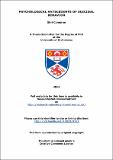Files in this item
Psychological antecedents of suicidal behavior
Item metadata
| dc.contributor.advisor | Brown, Verity Joy | |
| dc.contributor.author | Cameron, Shri | |
| dc.coverage.spatial | 306 | en_US |
| dc.date.accessioned | 2013-11-19T16:08:25Z | |
| dc.date.available | 2013-11-19T16:08:25Z | |
| dc.date.issued | 2013-11-29 | |
| dc.identifier.uri | https://hdl.handle.net/10023/4212 | |
| dc.description.abstract | While research highlights a number of risk factors for suicide, not all individuals displaying these characteristics will go on to attempt suicide. Depressed mood is a proximal indicator of suicide, with deterioration in already depressed mood increasing the likelihood of a suicide attempt. The overall aim of this thesis was to empirically test the Cognitive Model of Suicide by Wenzel and Beck (2008). This model proposes that each of the three components, dispositional vulnerabilities, mood disturbance and suicide related cognitions, may influence each other to enhance the propensity for a suicidal crisis. The thesis starts by examining the relationship between two personality characteristics (neuroticism and trait aggression) and current depressed mood, and then focuses on the relationship between suicidality and current depressed mood. Although autobiographical memories have been implied as a possible risk factor for suicidality, meta-analytical studies have highlighted discrepancies between sampling techniques which may limit interpretablity. Therefore, the first series of studies aimed to establish a protocol for assessing autobiographical memories. The second and third series of studies aimed to investigate whether the relationships between current depressed mood and specific personality factors (neuroticism and trait aggression) were indirectly influenced by other known risk factors that may affect cognitive processing of information (rumination, overgenerality, impulsivity). Moreover, these studies aimed to determine whether the same cognitive processing factors effected current depressed mood in non-suicidal and suicide attempt groups. The final series of studies aimed to determine whether these risk factors (neuroticism, trait aggression, brooding, impulsivity, and overgenerality) mediated the relationship between suicidality and current depressed mood. Findings indicated that compared to the non-suicidal group, individuals in the suicide attempt group was more likely to be influenced by the effects of trait aggression and brooding, and that the combination of these factors were positively associated with current depressed mood. In contrast, neuroticism and impulsivity appeared to influence individuals who had experienced suicidal ideation more than individuals who report never having suicidal thoughts or attempting suicide. Compared to the non-suicidal group, however, neuroticism and impulsivity did not show a significant association for current depressed mood in the suicidal ideation group. Findings supported the Interacting Sub-Systems model and are discussed in relation to the Cognitive Model of Suicide model. | en_US |
| dc.language.iso | en | en_US |
| dc.publisher | University of St Andrews | |
| dc.rights | Creative Commons Attribution-NoDerivs 3.0 Unported | |
| dc.rights.uri | http://creativecommons.org/licenses/by-nd/3.0/ | |
| dc.subject | Suicide | en_US |
| dc.subject | Personality | en_US |
| dc.subject | Depressed mood | en_US |
| dc.subject | Autobiographical memory | en_US |
| dc.subject | Neuroticism | en_US |
| dc.subject | Trait aggression | en_US |
| dc.subject | Rumination | en_US |
| dc.subject | Impulsivity | en_US |
| dc.subject.lcc | RC569.C2 | |
| dc.subject.lcsh | Suicidal behavior--Risk factors--Testing | en_US |
| dc.subject.lcsh | Depression, Mental | en_US |
| dc.subject.lcsh | Personality | en_US |
| dc.subject.lcsh | Neuroticism | en_US |
| dc.subject.lcsh | Aggressiveness | en_US |
| dc.subject.lcsh | Autobiographical memory | en_US |
| dc.title | Psychological antecedents of suicidal behavior | en_US |
| dc.type | Thesis | en_US |
| dc.type.qualificationlevel | Doctoral | en_US |
| dc.type.qualificationname | PhD Doctor of Philosophy | en_US |
| dc.publisher.institution | The University of St Andrews | en_US |
| dc.publisher.department | Psychological Therapies, NHS Tayside | en_US |
This item appears in the following Collection(s)
Except where otherwise noted within the work, this item's licence for re-use is described as Creative Commons Attribution-NoDerivs 3.0 Unported
Items in the St Andrews Research Repository are protected by copyright, with all rights reserved, unless otherwise indicated.


